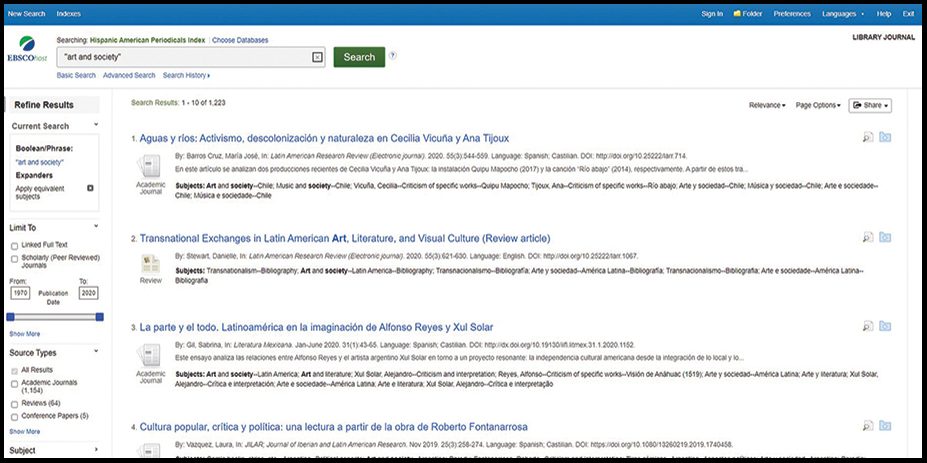EBSCO Hispanic American Periodicals Index | Reference eReviews
EBSCO’s Hispanic American Periodicals Index provides access to more than 335,000 citations, 170,000 links to full-text journals, and 700-plus journals, in Spanish, English, and Portuguese, dating back to the late 1960s. With regional publications in multiple languages, it stands out as a valuable resource for Latin American and Caribbean studies, as well as international politics, cultural and area studies, and multidisciplinary studies.
EBSCO Hispanic American Periodicals Index
CONTENT
Created by the Latin American Institute at the University of California, Los Angeles, EBSCO’s Hispanic American Periodicals Index (HAPI) provides access to more than 335,000 citations, 170,000 links to full-text journals, and 700-plus journals, in Spanish, English, and Portuguese, dating back to the late 1960s. Users can search in Spanish, English, and/or Portuguese. Citations include works published in Latin America and titles about the region published in other countries, such as the United States.
These journals explore political, economic, and social issues, as well as arts and humanities. Among the notable entries found here are Las Casa de las Américas (published in Cuba); Plural, Comercio Exterior, and Vuelta (Mexico); Cuadernos Hispanoamericanos (Spain); Cuadernos Americanos and Mensaje (Chile); Nueva Sociedad and Todos en Historia (Argentina); Revista Javariana (Colombia); Revista Nacional de Cultura (Venezuela); Vozes (Brazil); and the Hispanic American Historical Review, Revista Latinoamericana, and Journal of Latin American Studies (United States).
USABILITY
Like most indexes, this one has no frills. HAPI relies on EBSCO’s basic search as its default interface. The homepage features a simple search bar and a drop-down menu of options, including search modes (Boolean/phrase, “find all my search terms,” “find any of my search terms,” SmartText searching), as well as the option to apply related words or equivalent subjects. Users can limit results to linked full text, scholarly (peer-reviewed) journals, publication date or type (academic journal, conference proceeding, review), language (all, English, French, German, Italian, Portuguese, Spanish [including Castilian], Creole languages, and Indigenous languages), author, title, and source.
Advanced search includes all of the options listed above, but also lets users rely on multiple fields using “and,” “or,” and “not” functions.
A search history page makes it easy to refer to previous searches, retrieve searches, and retrieve alerts when conducting research.
Users can access a list of the indexes via a link in the top left corner of the navigation bar, but some knowledge of the subject is necessary to make the best use of it. Users can browse an index by author, document title, ISSN, keyword, language, publication name, and year of publication, or conduct a search. Browsing by publication name is the closest users can get to a list of publications indexed here. Titles are listed alphabetically, and a record count is provided for each, but users must click through each page to advance the title list, making it a clunky option for browsing.
A list of suggested search terms makes it easy to refine or modify keywords for effective searching; for instance, when users type in “Trujillo,” “Trujillo dictatorship,” “Trujillo Valle,” and “Trujillo Rafael” are suggested. A search for “Trujillo dictatorship” produces five results, with the search terms highlighted in bold.
Users can preview the citation and abstract by hovering over the magnifying glass icon to the right of the record, save the record to a folder, share results, create an alert via email or RSS, and find the permalink to their search under the “share options” menu. Users can sort results by relevance, date (newest or oldest), and author, or modify the layout of the results page under “page options.”
The full record for each entry includes the title, language of publication, authors, source and publisher location, publication date, document type, a listing of subject terms and keywords, DOI, ISSN, a reproduction of the original abstract, notes, access URL(s) for the journal, reproduction rights, and accession number. The record for the article “‘A Veil of Legality’: The Contested History of Anti-Haitian Ideology Under the Trujillo Dictatorship,” for instance, includes access URLS via Brill Online and JSTOR.
In keeping with the contents of the index, subject terms are listed in multiple languages.
Beyond the various sharing options, additional tools are available for users to save records to Google Drive, add to folder, print, email, save, cite, export, create a note, or copy the permalink. Export options include direct export in RIS format to citation managers such as EasyBib, EndNote, ProCite, Zotero, etc., a generic export to bibliographic software tools or to RefWorks, EndNote Web, EasyBib, and NoodleTools, as well as the option to save citations in XML, BibTeX, or Marc21, and download as a CSV file.
Lastly, users can search for related content using the “find similar results” option.
PRICING
Pricing for academic institutions is based on a variety of factors including but not limited to full-time enrollment, existing EBSCO databases, consortium agreements, and/or buying groups. Please contact EBSCO for a customized quotation.
VERDICT
With regional publications in multiple languages, HAPI stands out as a valuable resource for Latin American and Caribbean studies, as well as international politics, cultural and area studies, and multidisciplinary studies. Heavily geared toward academic and research institutions, the database is best suited for advanced users and those with subject expertise or knowledge of relevant titles. New researchers may find it difficult to make effective use of the search and browse options available. A list of publications or subject categories would enhance the overall functionality for users with limited expertise.
Gricel Dominguez is a librarian at Florida International University Library, Miami.
RELATED
RECOMMENDED
TECHNOLOGY
ALREADY A SUBSCRIBER? LOG IN
We are currently offering this content for free. Sign up now to activate your personal profile, where you can save articles for future viewing










Add Comment :-
Comment Policy:
Comment should not be empty !!!